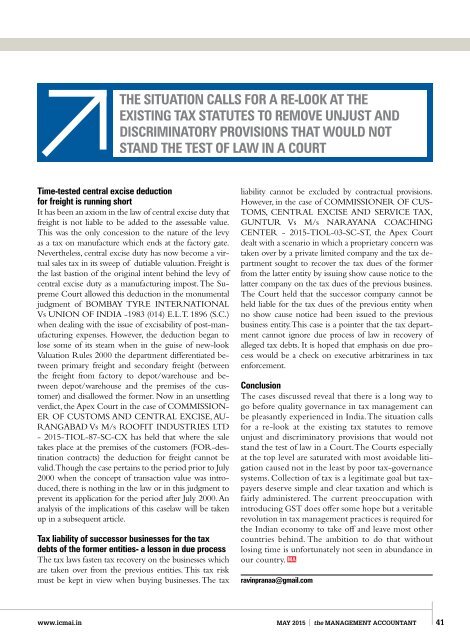May-2015
May-2015
May-2015
Create successful ePaper yourself
Turn your PDF publications into a flip-book with our unique Google optimized e-Paper software.
THE SITUATION CALLS FOR A RE-LOOK AT THE<br />
EXISTING TAX STATUTES TO REMOVE UNJUST AND<br />
DISCRIMINATORY PROVISIONS THAT WOULD NOT<br />
STAND THE TEST OF LAW IN A COURT<br />
Time-tested central excise deduction<br />
for freight is running short<br />
It has been an axiom in the law of central excise duty that<br />
freight is not liable to be added to the assessable value.<br />
This was the only concession to the nature of the levy<br />
as a tax on manufacture which ends at the factory gate.<br />
Nevertheless, central excise duty has now become a virtual<br />
sales tax in its sweep of dutiable valuation. Freight is<br />
the last bastion of the original intent behind the levy of<br />
central excise duty as a manufacturing impost. The Supreme<br />
Court allowed this deduction in the monumental<br />
judgment of BOMBAY TYRE INTERNATIONAL<br />
Vs UNION OF INDIA -1983 (014) E.L.T. 1896 (S.C.)<br />
when dealing with the issue of excisability of post-manufacturing<br />
expenses. However, the deduction began to<br />
lose some of its steam when in the guise of new-look<br />
Valuation Rules 2000 the department differentiated between<br />
primary freight and secondary freight (between<br />
the freight from factory to depot/warehouse and between<br />
depot/warehouse and the premises of the customer)<br />
and disallowed the former. Now in an unsettling<br />
verdict, the Apex Court in the case of COMMISSION-<br />
ER OF CUSTOMS AND CENTRAL EXCISE, AU-<br />
RANGABAD Vs M/s ROOFIT INDUSTRIES LTD<br />
- <strong>2015</strong>-TIOL-87-SC-CX has held that where the sale<br />
takes place at the premises of the customers (FOR-destination<br />
contracts) the deduction for freight cannot be<br />
valid. Though the case pertains to the period prior to July<br />
2000 when the concept of transaction value was introduced,<br />
there is nothing in the law or in this judgment to<br />
prevent its application for the period after July 2000. An<br />
analysis of the implications of this caselaw will be taken<br />
up in a subsequent article.<br />
Tax liability of successor businesses for the tax<br />
debts of the former entities- a lesson in due process<br />
The tax laws fasten tax recovery on the businesses which<br />
are taken over from the previous entities. This tax risk<br />
must be kept in view when buying businesses. The tax<br />
liability cannot be excluded by contractual provisions.<br />
However, in the case of COMMISSIONER OF CUS-<br />
TOMS, CENTRAL EXCISE AND SERVICE TAX,<br />
GUNTUR Vs M/s NARAYANA COACHING<br />
CENTER - <strong>2015</strong>-TIOL-03-SC-ST, the Apex Court<br />
dealt with a scenario in which a proprietary concern was<br />
taken over by a private limited company and the tax department<br />
sought to recover the tax dues of the former<br />
from the latter entity by issuing show cause notice to the<br />
latter company on the tax dues of the previous business.<br />
The Court held that the successor company cannot be<br />
held liable for the tax dues of the previous entity when<br />
no show cause notice had been issued to the previous<br />
business entity. This case is a pointer that the tax department<br />
cannot ignore due process of law in recovery of<br />
alleged tax debts. It is hoped that emphasis on due process<br />
would be a check on executive arbitrariness in tax<br />
enforcement.<br />
Conclusion<br />
The cases discussed reveal that there is a long way to<br />
go before quality governance in tax management can<br />
be pleasantly experienced in India. The situation calls<br />
for a re-look at the existing tax statutes to remove<br />
unjust and discriminatory provisions that would not<br />
stand the test of law in a Court. The Courts especially<br />
at the top level are saturated with most avoidable litigation<br />
caused not in the least by poor tax-governance<br />
systems. Collection of tax is a legitimate goal but taxpayers<br />
deserve simple and clear taxation and which is<br />
fairly administered. The current preoccupation with<br />
introducing GST does offer some hope but a veritable<br />
revolution in tax management practices is required for<br />
the Indian economy to take off and leave most other<br />
countries behind. The ambition to do that without<br />
losing time is unfortunately not seen in abundance in<br />
our country.<br />
ravinpranaa@gmail.com<br />
www.icmai.in<br />
MAY <strong>2015</strong> the MANAGEMENT ACCOUNTANT 41


